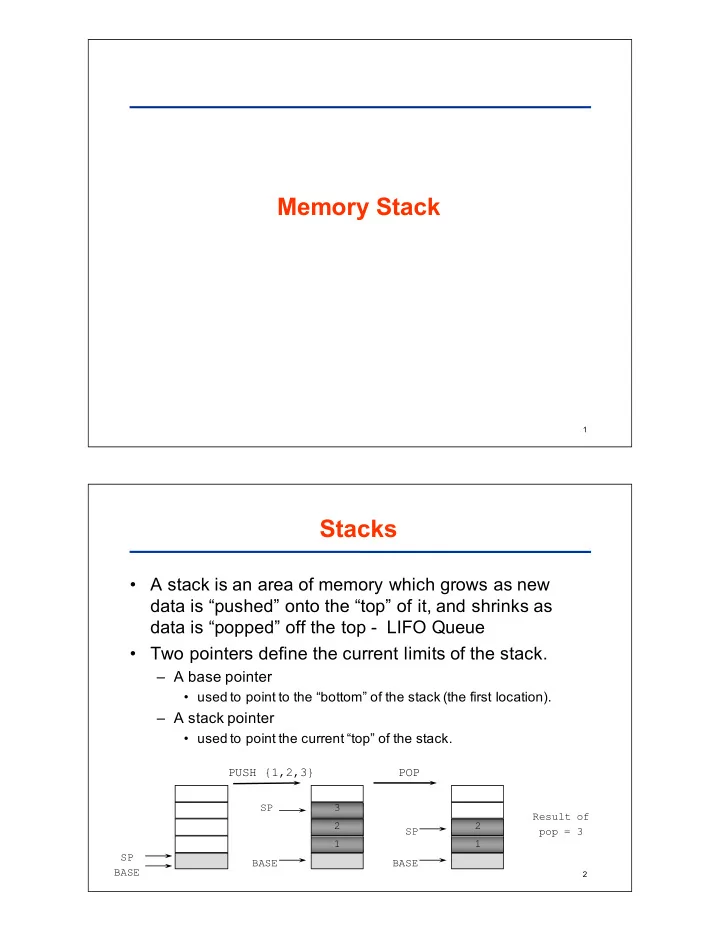

Memory'Stack 1 Stacks • A%stack%is%an%area%of%memory%which%grows%as%new% data%is%“pushed”%onto%the%“top”%of%it,%and%shrinks%as% data%is%“popped”%off%the%top%< LIFO%Queue • Two%pointers%define%the%current%limits%of%the%stack. – A%base%pointer% • used%to%point%to%the%“bottom”%of%the%stack%(the%first%location). – A%stack%pointer • used%to%point%the%current%“top”%of%the%stack.% PUSH {1,2,3} POP SP 3 Result of 2 2 SP pop = 3 1 1 SP BASE BASE BASE 2
Stack'Operation' Multiple<register%transfer%instructions%are%particularly%useful%for%% stack%operation. Stack%is%used%to%save%multiple<register%content%that%may%be%affected% when%performing%a%subroutine%call.%% Using%one% STM instruction%can%save%several%registers%onto%the% stack. Example:% To%save%multiple<register%content%on%a%stack% STMDB sp!, {r4-r8} This%instruction%‘pushes’%the%four<register%content%to%the%stack. The%corresponding%instruction%to%‘pop’%the%content%from%the%stack%is% LDMIA sp!, {r4-r8} 3 Stack'Implementations' The%option%of%using%‘ DB ’%or%‘ DA ’%for%push%operation%(&% ‘ IA ’%or%‘ IB ’%for%corresponding%pop%operation)%depends% on%the%way%a%stack%is%implemented. • Full%stack:%address%pointed%by%sp%is%already%used%% • Empty%stack:%address%pointed%by%sp%is%still%empty • Descending:%stack%grows%down%in%memory%address • Ascending:%stack%grows%up%in%memory%address Discussion:% The%earlier%example%uses% STMDB and% LDMIA to% manipulate%the%stack%content.%What%type%of%stack%is%this? 4
Stack4Specific'Instructions' To%avoid%using%the%wrong%type%of% STM and% LDM instructions%when%dealing%with%stack%operation • special%suffixes%are%used%instead%to%match%the%different% stack%implementation • FD :%for%Fully%Descending%stack • FA :%for%Fully%Ascending%stack • ED :%for%Empty%Descending%stack • EA :%for%Empty%Ascending%stack Example:% For%the%ARM%processor%that%uses%a%fully%descending% stack,%the%pair%of%stack%instructions%is% STMFD and% LDMFD . 5 Stack'Operation • Stack%Usually%Grows%Down%in%Memory – last%“pushed”%value%is%at%the%lowest%address • ARM%also%supports%ascending%stacks% – stack%structure%grows%up%through%memory.% • The%value%of%the%stack%pointer%can%either: – Point%to%the%last%occupied%address%(Full%stack) • needs%pre<decrementing%(ie%before%the%push) – Point%to%the%next%occupied%address%(Empty%stack) • needs%post<decrementing%(ie%after%the%push) 6
Stack'Operation • Stack%Type%to%be%used%is%given%by%the%postfix% to%the%instruction: – STMFD /% LDMFD :%Full%Descending%stack – STMFA /% LDMFA :%Full%Ascending%stack. – STMED /% LDMED :%Empty%Descending%stack – STMEA /% LDMEA :%Empty%Ascending%stack • ARM%Compiler%will%always%use%a%Full% descending%stack 7 Stack'Examples STMED sp!,{r0,r1,r3-r5} STMEA sp!,{r0,r1,r3-r5} 0x418 r5 SP SP r4 r5 r3 r4 r1 r3 r0 r1 r5 r0 Old%SP Old%SP Old%SP 0x400 Old%SP r5 r4 r4 r3 r3 r1 r1 r0 r0 SP SP 0x3e8 STMFD sp!{r0,r1,r3-r5} STMFA sp!,{r0,r1,r3-r5} 8
Stacks'and'Subroutines • Stacks%can%be%Used%to%create%temporary%register% workspace%for%subroutines.% • Any%registers%that%are%needed%can%be%pushed%onto% the%stack%at%the%start%of%the%subroutine%and%popped%off% again%at%the STMFD sp!,{r0-r12, lr} ; stack all registers ........ ; and the return address ........ LDMFD sp!,{r0-r12, pc} ; load all the registers ; and return automatically 9 Functionality'of'Block'Data'Transfer • When% LDM /% STM are%not%being%used%to%implement% stacks,%it%is%clearer%to%specify%exactly%what% functionality%of%the%instruction%is: – i.e.%specify%whether%to%increment%/%decrement%the%base% pointer,%before%or%after%the%memory%access. • In%order%to%do%this,% LDM /% STM support%a%further%syntax% in%addition%to%the%stack%one:% – STMIA /% LDMIA :%Increment%After – STMIB /% LDMIB :%Increment%Before – STMDA /% LDMDA :%Decrement%After – STMDB /% LDMDB :%Decrement%Before 10
Example:'Block'Copy – Copy%a%block%of%memory,%which%is%an%exact%multiple%of%12%words% long%from%the%location%pointed%to%by%r12%to%the%location%pointed% to%by%r13.%r14%points%to%the%end%of%block%to%be%copied. ; r12 points to the start of the source data ; r14 points to the end of the source data ; r13 points to the start of the destination data r13 loop LDMIA r12!, {r0-r11} ; load 48 bytes r14 STMIA r13!, {r0-r11} ; and store them Increasing CMP r12, r14 ; check for the end Memory BNE loop ; and loop until done r12 – This%loop%transfers%48%bytes%in%31%cycles – Over%50%Mbytes/sec%at%33%MHz 11 Load'and'Stores'4 User'Mode'Privilege • When%using%post<indexed%addressing,%there%is%a%further% form%of%Load/Store%Word/Byte: <LDR|STR>{<cond>}{B} T Rd, <post_indexed_address> • When%used%in%a%privileged%mode,%this%does%the% load/store%with%user%mode%privilege. – Normally%used%by%an%exception%handler%that%is%emulating%a% memory%access%instruction%that%would%normally%execute%in%user% mode. 12
Example'Usage'of'Addressing'Modes • Imagine%an%array,%the%first%element%of%which%is%pointed%to%by%the% contents%of% r0 . • If%we%want%to%access%a%particular%element, Memory% element Offset then%we%can%use%pre<indexed%addressing: – r1 is%element%we%want. – LDR r2, [r0, r1, LSL #2] 3 12 Pointer%to% 2 8 • If%we%want%to%step%through%every start%of%array 1 4 element%of%the%array,%for%instance r0 0 0 to%produce%sum%of%elements%in%the array,%then%we%can%use%post<indexed%addressing%within%a%loop: – r1 is%address%of%current%element%(initially%equal%to%r0). – LDR r2, [r1], #4 Use%a%further%register%to%store%the%address%of%final%element, so%that%the%loop%can%be%correctly%terminated. 13 Offsets'for'Halfword'and'Signed' Halfword'/'Byte'Access • The%Load%and%Store%Halfword%and%Load% Signed%Byte%or%Halfword%instructions%can% make%use%of%pre< and%post<indexed% addressing%in%much%the%same%way%as%the% basic%load%and%store%instructions. • However%the%actual%offset%formats%are%more% constrained: – The%immediate%value%is%limited%to%8%bits%(rather% than%12%bits)%giving%an%offset%of%0<255%bytes. – The%register%form% cannot have%a%shift%applied%to%it. 14
Block'Data'Transfer • The%Load%and%Store%Multiple%instructions%( LDM/STM )%allow% between%1%and%16%registers%to%be%transferred%to%or%from%memory. • The%transferred%registers%can%be%either: – Any%subset%of%the%current%bank%of%registers%(default). – Any%subset%of%the%user%mode%bank%of%registers%when%in%a%privileged% mode%(postfix%instruction%with%a%‘ ^ ’). 24 23 22 21 20 19 31 28 27 16 15 0 Cond 1 0 0 P U S W L Rn Register list Base register Each bit corresponds to a particular Condition field register. For example: Up/Down bit Load/Store bit • Bit 0 set causes r0 to be transferred. 0 = Down; subtract offset from base 0 = Store to memory • Bit 0 unset causes r0 not to be transferred. 1 = Up ; add offset to base 1 = Load from memory At least one register must be transferred Write- back bit Pre/Post indexing bit as the list cannot be empty. 0 = no write-back 0 = Post; add offset after transfer, 1 = write address into base 1 = Pre ; add offset before transfer PSR and force user bit 0 = don’t load PSR or force user mode 1 = load PSR or force user mode 15 Block'Data'Transfer • Base%register%used%to%determine%where%memory% access%should%occur. – 4%different%addressing%modes%allow%increment%and% decrement%inclusive%or%exclusive%of%the%base%register% location. – Base%register%can%be%optionally%updated%following%the% transfer%(by%appending%it%with%an%‘ ! ’. – Lowest%register%number%is%always%transferred%to/from%lowest% memory%location%accessed. • These%instructions%are%very%efficient%for – Saving%and%restoring%context • For%this%useful%to%view%memory%as%a%stack. – Moving%large%blocks%of%data%around%memory • For%this%useful%to%directly%represent%functionality%of%the% instructions. 16
Swap'and'Swap'Byte'Instructions • Atomic%operation%of%a%memory%read%followed%by%a%memory%write% which%moves%byte%or%word%quantities%between%registers%and% memory.% • Syntax: SWP{<cond>}{B} Rd, Rm, [Rn] Rn temp 1 3 2 Rm Memory Rd • Thus%to%implement%an%actual%swap%of%contents%make%Rd%=%Rm. • The%compiler%cannot%produce%this%instruction. 17 Data'Movement'Instructions ARM%can%only%manipulate%data%within%registers. • so%data%has%to%be%loaded%from%memory%into% register(s)%for%data%operation • with%results%eventually%stored%back%into%memory A%lot%of%instructions%in%a%running%program%involve%data% movement. • important%to%have%efficient%addressing%mode%and%data% loading%and%storing%instructions • to%optimize%processor%performance 18
Recommend
More recommend